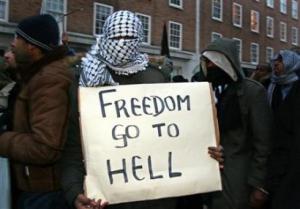Public opinionNo rise in anti-Muslim sentiment in U.K. in wake of Paris attacks: Poll
Last month’s terrorist attacks in Paris appear not to have led to a rise in anti-Muslim sentiment in Britain, a new study has shown. The new research comes amid concerns that Western public opinion may grow more hostile toward Muslims, as evidenced by the success of the Front National in the first t round of France’s regional elections three weeks ago, and the apparent popularity of Republican presidential candidate Donald Trump, who has called for a ban on Muslim immigration to the United States.

Muslim demonstrator in London // Source: commons.wikimedia.org
Last month’s terrorist attacks in Paris appear not to have led to a rise in anti-Muslim sentiment in Britain, a new study has shown.
The new research, conducted by Rob Ford and Maria Sobolewska of the University of Manchester, comes amid concerns that Western public opinion may grow more hostile toward Muslims, as evidenced by the success of the Front National in the first t round of France’s regional elections three weeks ago, and the apparent popularity of Republican presidential candidate Donald Trump, who has called for a ban on Muslim immigration to the United States.
International Business Times reports that the academics asked the same questions both before and after the Paris attacks on 13 November. Before Paris, 33 percent of respondents agreed that “Muslims have a lot to offer British culture,” compared to 35 percent who disagreed. After Paris the proportion who disagreed remained the same, but an additional 2 percent agreed with the statement.
The researchers note that a similar modest increase in the proportion of tolerant respondents was shown in the responses to the statement “Muslims in Britain have respect for the way of life of others.” Before the Paris attacks, 23 percent of respondents agreed with that statement, compared to a far larger 53 percent who disagreed. After the Paris attacks, the positive proportion increased to 27 percent, whereas the proportion disagreeing declined to 51 percent.
The most noticeable change in respondents’ attitudes was apparent when respondents were asked whether they felt London was better or worse off due to its ethnic and religious diversity. Pre-Paris attacks, 40 percent felt the capital was better off or much better off for its diversity, whereas 32 percent thought it was worse off or much worse off.
After Paris, the proportion with a positive attitude swelled to 43 percent, but the proportion who felt London was worse off for its diversity fell by a quarter to 24 percent. IBT notes that the respondents were drawn from the whole of Great Britain, not just London, and thus the responses may reflect a tendency among Brits to rally round London and defend it as a symbol of diversity.
Rob Ford commented that the study, saying it “suggests that ISIS failed in their stated objective of sowing division between Muslims and non-Muslims in Britain. Far from raising anxiety about diversity and Islam, the Paris attacks strengthened liberal and multicultural views.”
Maria Sobolewska added: “While tolerance is clearly not a universal value in Britain, it is a resilient one for those who hold it. The Paris attacks did not deepen divisions among our respondents, as pessimists feared. Instead they encouraged a stronger expression of the inclusive tolerance the terrorists threaten and reject.”
1,707 people were surveyed in the first round of the study between 10 and 12 November, and 1,621 were surveyed in the second round on 17 and 18 November. Both surveys were conducted online using the YouGov panel.
